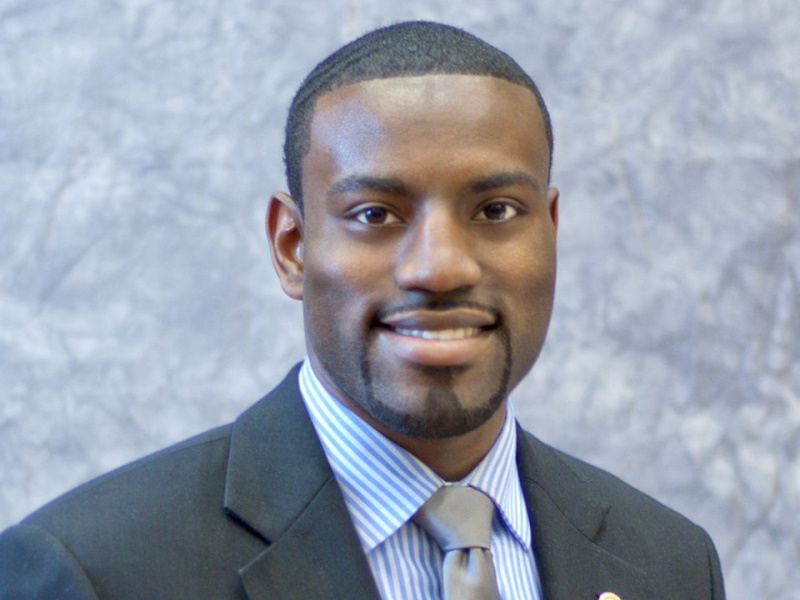Legislators Clash On Police Funding
A heated debate as Republicans condemn Milwaukee and Milwaukee legislators defend the city.

Rep. David Bowen.
A Republican bill which would decrease municipalities’ shared revenue funds according to how much they defund police sparked a heated back and forth among state representatives during the state’s June 22 Assembly floor session. On one side stood conservative representatives who firmly held a position that Milwaukee is a violent, terrifying place that needs more police. On the other, state legislators from the city who took swipes at GOP rhetoric on Milwaukee and Republicans’ unwillingness to explore public safety strategies beyond law enforcement.
“I just don’t know how you can look those same folks in the eye and tell them that you support them when, in reality, you’re setting up officers to fail,” said Rep. David Bowen (D-Milwaukee), one of several Democrats from the city who spoke up on the bill introduced by Sen. Van Wanggaard (R-Racine) as a direct response to the defund-the-police movement.
While Republicans have focused on the protest movement of 2020 as a main motivator behind the legislation, the bill goes deeper. As the Examiner reported earlier this month, some areas have been forced to cut emergency services not because of protests, but because their areas have been systematically drained of revenue for years. Milwaukee legislators say that the city, often called the state’s economic engine, is being treated more like a place of plunder.
“At this point we’re becoming a gold mine,” said Bowen, “because you’re extracting the gold. You’re extracting the resources from our local municipality and you’re not pouring back in. We have a chance in this body to set a different trend. To actually go to those municipalities and say, ‘Let’s be partners with you and invest in the services that we know that people need. And not leave you in a position to be able to take from one and give to the other.’”
On Bowen’s heels came comments by Rep. Jonathan Brostoff (D-Milwaukee). “You know what makes the public safe?” He asked. “Resources. Which is exactly what this bill aims to starve communities across the state of.” Brostoff insisted, “resources make communities safer — of course.” Recreational opportunities, human resources, green space and well-paved roads, Brostoff added, are hallmarks of well-resourced communities, which also have less crime. Conversely, areas with much fewer and less diversified resources tend to have more crime.
Talking directly to Speaker Robin Vos, who was standing at the front of the room along with other top Republicans, Brostoff said, “If you and the Republicans are interested in making our communities safer, you would be interested and you’d be willing to talk about increasing funding and increasing resources, not taking stuff away.” He added, “Yeah you want to virtue signal, yeah you want to throw all this saucy language out there, but what you’re talking about is starving communities that are already going hungry.”
Several proposals which would have increased state revenue or helped address existing problems were turned down by GOP-controlled committees. Whether it was legalizing cannabis and investing money from its sale in struggling communities or allocating funding for new juvenile facilities so that the troubled Lincoln Hills juvenile correctional facility could finally be closed, or several bills focused on addressing water quality issues across the state. “What’s the result?” Brotoff asked. “More wasteful spending, more crime, more poverty, more harm, more police brutality, more Republican pay-offs to the special interest groups that control them, less safety.” None of those points appeared to make a dent with Brostoff and Bowen’s colleagues across the aisle.
Rep. Janel Brandtjen (R-Menomonee Falls) countered that certain cities don’t have funding because people don’t want to live there. She spoke of a shop her family once maintained on Milwaukee’s North Side which closed because they feared the area wasn’t safe. “Little by little Milwaukee has reduced its police force,” said Brandtjen. “Less cops means one simple thing,” she continued in a low, dramatic tone. “People’s lives are in danger, and people can die.” Brandtjen went on to claim that “a large part of Milwaukee is now run by gangs.” Name checking Milwaukee and Madison Brandtjen said with disgust, “Don’t lie, they’re horrendous.”
“This bill is brought out because we have a large group of people that think that defunding the cops means success,” she continued.
Brandtjen’s remarks were met with fury from Rep. LaKeshia Myers (D-Milwaukee). “Mr. Speaker, the Academy Award goes to my colleague,” Myers said of Brandtjen’s statements. Myers asked her GOP counterparts, “Where in the hell are you talking about? Because my address is in the city of Milwaukee, born and raised — May 21, 1984 in the Milwaukee County Medical Complex.” Myers pushed back at GOP comments on Milwaukee as disconnected fear mongering. “It is absolutely ridiculous to stand here and listen to somebody talk about where you live, and they don’t live there,” she said.
Myers emphasized that Milwaukee already spends 46% of its entire budget on police. That figure leaves many other services, including fire departments, under-funded and struggling. “What I see are people who come into the city of Milwaukee every day,” she continued, “and around 5 o’clock to 5:30 they leave out of the city of Milwaukee, every day. So Milwaukee is good enough for you to come in to make your money, and drive back to your respective suburb. So if it’s good enough for that, why isn’t it good enough to fund?” Next Myers took on the income and sales taxes Milwaukee sends to the state and how the city is shortchanged in state shared revenue it gets back. “Mr. Speaker, I’m here to collect 66 cents on every dollar that we send back, can I have my check please? I’ll wait.”
Myers also listed numerous crime-prevention strategies Milwaukee has attempted to institute which don’t involve police — from the Office of Violence Prevention to mentor programs which allow formerly incarcerated people to intervene in community disputes to other community organizations working with close to no support. District Attorney John Chisholm has promoted those programs, and expressed his hopes that under the Biden administration funding would become available for a diverse array of strategies rather than just more police.
As the debate continued, Rep. Joe Sanfelippo (R- New Berlin) brought it to another level. Sanfelippo, who championed Milwaukee-focused tougher on crime bills and recently called for the National Guard to be deployed to the city to fight crime, took a direct shot at Bowen and Brostoff. He called it “ironic” that Brostoff and Bowen “lectured” Republicans “when both of them actively participated in demonstrations against the police, criticizing them. Not even demonstrations, riots are more the word where urine and feces and rocks were hurled at police, guns were pulled on them.”
In August, a confrontation between a former Wauwatosa officer and protesters resulted in a gun being fired outside the officer’s home during a demonstration. Accounts differed as to the precipitating events, with the officer’s own story contradicting the official statements put out by Wauwatosa PD at the time. No one was injured and three protesters were quickly arrested and charged after the incident. Although Bowen wasn’t one of them, Sanfelippo accused him of attempting to “cover up” the incident.
Sanfelippo’s comments ignored several concerning facts about how Wauwatosa PD investigated protests. A Wauwatosa detective’s attempts to put Bowen on a “higher value target” list along with Mayor Dennis McBride and others after the August incident was the subject of an internal investigation. Wauwatosa PD claimed it never targeted Bowen. Bowen was also logged as arrested and ticketed for protesting when, in fact, that never happened. Sanfelippo’s remarks were rebuked by the Speaker Pro Tempore Rep. Tyler August (R- Lake Geneva) who stated, “We do not use the Assembly floor to disparage other members. That’s a long-standing tradition.”
Later, as the Assembly was moving on to other business, Bowen rose to speak once more. “I think it’s important that we at least keep a level of civility,” said Bowen as the debate over the police bill ended. “And if we’re not going to have that,” he continued, “it’s going to be a different precedent of how we will operate and engage with each other. But I think we can still talk about the issues. I think we can still have conversations about what is best for the future of this state. But if it is going to go to that level, it is going to really put a stain on this body at a moment when citizens in our state are really calling for changes for the best for our future.”
Defund the police debate turns to Milwaukee fear-mongering was originally published by the Wisconsin Examiner.






















The Wisconsin right wing media is full of Milwaukee-bashing, and those outside the city Republicans seem to have drunk deeply from that well of disinformation, resulting in their distorted view of what life is like living in a vibrant, diverse, and beautiful city.
Rep. Brandtjen’s comments reflect a lack of understanding about investments in Milwaukee. According to the Wisconsin Department of Revenue, the value of “net new construction in the city has been more than $1.1 billion during the 3 years 2018 through 2020. This is the value of new construction and remodeling, not the impact of hot property markets on property values.
In addition, her party’s reductions to State Shared Revenue have placed tremendous constraints on the City’s Budget. The City has responded with implementing user charges and eliminating hundreds of funded positions throughout departments. But the well has run dry. It’s Republican State fiscal policy, not local preference, that results in reduced police staffing.